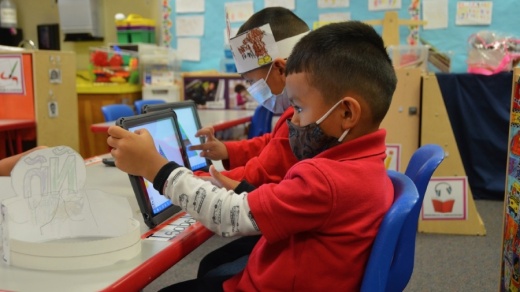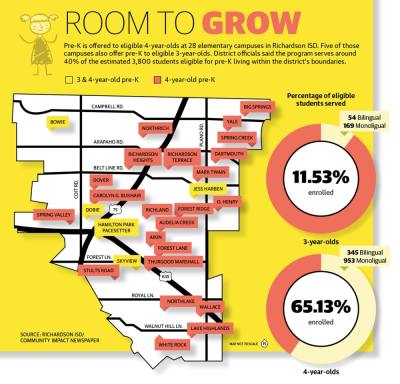The district decided to convert its previous half-day pre-K to full-day in 2019, just prior to the signing of House Bill 3. That law requires all public school districts in Texas to offer free, full-day pre-K to qualifying 4-year-olds and encourages the service be offered for 3-year-olds.
“[For] a lot of families, [half-day pre-K] was not doable,” Stone said during the Oct. 18 RISD board of trustees meeting. “That’s when we really started to put the emphasis on full-day pre-K and making space to accommodate the families that needed it.”
Pre-K programs like RISD’s help prepare students for the grade levels that follow, said Kelley Estes-Jones, early childhood program coordinator with Region 10 Education Service Center. Region 10 offers professional development and other assistance to North Texas school districts, including RISD.
“If you think about a house or a tall building, you have to have that foundation that must be strong,” Estes-Jones said. “That is why the prekindergarten programs are just vital to the overall success of the children and their families moving forward in their educational careers.”
Preparing for kindergarten
Deputy Superintendent Tabitha Branum said during the Oct. 18 meeting that the ultimate goal of the district’s pre-K program is to prepare each of its students for kindergarten. To accomplish that, RISD offers monolingual and bilingual classes for students.
“A lot of people will have a misconception that [pre-K students] are playing all day,” Branum said during the meeting. “[While] they do a lot of that, ... there’s a tremendous amount of learning design that happens on behalf of our teachers.”
In April, the RISD board approved Frog Street Pre-K materials for use with the district’s curriculum.
“Frog Street is a phenomenal program that addresses the academic needs of students as well as the social and emotional needs of 3- and 4- year-olds,” Branum said.
Kristy Allgood, an English as a Second Language teacher at Liberty Junior High, sent her daughter Acey to Dobie Pre-Kindergarten School for two years.
“It was literally the best decision I made as a parent,” she said. “I have all the skills and the materials that I would need to homeschool my kids, but I can’t mimic the social [aspects].”
To help monitor kindergarten readiness, RISD uses the Circle Progress Monitoring assessment, which is one option available to Texas school districts. Branum said its data is used to tailor instruction to individual students.
In addition to preparing lessons for students, Branum said RISD’s pre-K teachers also participate in professional learning community meetings and receive regular professional development from the district and Region 10.
“We always give [teachers various techniques and strategies] that they can take back and immediately put into place in the classroom,” Estes-Jones said. “For a young child, planned, purposeful play is their highest level of thinking. They learn through experience and problem solving.”
Growing the program
RISD’s pre-K program has grown from half- or full-day options at 19 campuses in the 2019-20 school year to full-day classes offered at more than 70% of its 41 elementary schools this school year.
The district’s middle school transformation plan will free up additional space for pre-K classes at elementary schools, according to officials. The $750 million bond package approved by RISD voters in May will allow the district to make facility adjustments at junior high campuses over several years to make room for sixth graders who are currently housed at elementary schools, according to officials.
The goal is to complete construction at all campuses by the 2030-31 school year, officials said.
Data from the Circle assessments given at the beginning of the school year showed most of the district’s pre-K students scored higher than last year in letter recognition, vocabulary, early writing skills, social emotional skills and mathematics, Branum said.
“[All] of our pre-K students are in person this year—we do not have the virtual classroom option available for pre-K [like] we did last year,” she said. “We believe that is one of the most significant contributing factors to why we’re seeing some of these increases.”
As a teacher aide at Dobie Pre-Kindergarten School, Selene Perez said she has seen the difference pre-K makes for students. And that played a part in her decision to put her son in RISD’s program, she said.
“When they opened up the pre-K [classes for 3-year-olds], I was so excited because this is exactly what my son needs and what other parents need,” Perez said. “Because the earlier you start, I really do believe it makes a huge difference.”
Future growth
RISD Board President Regina Harris said she visited some of the district’s pre-K classrooms before the COVID-19 pandemic closed schools to the public.
“I was super excited to see the work that’s being done,” she said during the Oct. 18 meeting. “I’m just ready to open [the program] up and offer that opportunity to so many [of our other kids] in RISD because they deserve it.”
For students to qualify for RISD’s pre-K program, parents not employed by the district must meet specific service, linguistic or economic criteria set forth by the state. Branum said there are roughly 4,000 eligible students who reside in the district. Currently, the program serves a little more than 1,500 students.
“We do have a vision set forward in our strategic plan, where we hope ... to serve all of our 4-year-old students because we believe that pre-K should be an opportunity that we give to all,” Branum said during the meeting.
Officials said the extra space created with the middle school transformation plan could also allow the district to serve students who do not qualify for the pre-K program.
“We have a line of community members that would want to pay tuition to access our pre-K,” Branum said during the meeting. “We could also just offer [spots to interested parents] as a part of our pre-K program, [though] we would not receive funding for students who did not qualify.”
Stone said RISD has also begun exploring the possibility of offering extended hours and year-round pre-K, both of which would benefit parents who work outside of the district’s typical operating hours.
One of the biggest challenges RISD has faced is finding highly qualified pre-K teachers and support staff, especially for bilingual and special education students, Branum said. Estes-Jones said that is a challenge faced by many districts in Region 10.
“We need quality teachers in every classroom, not just [for students who] are tested [through the State of Texas Assessments of Academic Readiness],” Stone said during the meeting.
Editor's note: This article has been updated to clarify the requirement in House Bill 3 for qualifying 4-year-olds to be offered full-day pre-K.







